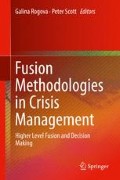Abstract
Successful management of critical situations created by major natural and man-made activities requires monitoring, recognizing, fusing, and making sense of these activities in order to support decision makers in either preventing a crisis or acting effectively to mitigate its adverse impact. Context plays an important role in crisis management since it provides decision makers with important knowledge about current situations and situation dynamics in relation to their goals, functions, and information needs, to enable them to appropriately adapt their decisions and actions. Efficient context exploitation for crisis management requires a clear understanding of what context is, how to represent it and use it. The chapter provides a brief discussion of the key issues of the problem of context definition, representation, discovery, and utilization in crisis management.
This chapter is an extended and revised version of (Rogova 2009)
Access this chapter
Tax calculation will be finalised at checkout
Purchases are for personal use only
References
Akman V, Surav M (1997) The use of situation theory in context modeling. Comp Intell 13:3
Bettini C, Brdiczka O, Henricksen K, Indulska J, Nicklas D, Ranganathan A, Riboni D (2010) Asurvey of context modelling and reasoning techniques. Perv Mob Comput 6(2):161–180
Brézillon P (2003) Context dynamic and explanation in contextual graphs. In: Blackburn P et al (eds) CONTEXT 2003, vol LNAI 2680. Springer, New York, NY, pp 94–106
Brézillon P, Pomerol J-C (1999) Contextual knowledge sharing and cooperation in intelligent assistant systems. Le Travail Humain 62(3):223–246
Brezzilon P (1999) Context in problem solving: a survey. Knowl Eng Rev 14(1):47–80
Devlin K (1991) Logic and information. Press Syndicate of the University of Cambridge, Cambridge
Dey A (2001) Understanding and using context. Pers Ubiquit Comput 5(1):4
Gong L (2005) Contextual modeling and applications. In: Proc IEEE International Conference on SMC, vol V1. IEEE, Washington, DC
Jensen FV (1996) An introduction to Bayesian networks. Springer, New York, NY
Josephson J (1990) On the logical form of abduction. In: AAAI Spring symposium series: automated abduction. AAAI, Menlo Park, CA, pp 140–144
Kalyan A, Gopalan S, Sridhar V (2005) Hybrid context model based on multilevel situation theory and ontology for contact centers. In: Proc of the 3rd Int’l Conf on Pervasive computing and communications workshops (PerCom 2005 Workshops). IEEE, Washington, DC, pp 3–7
Kokar M, Matheus CJ, Baclawski K (2009) Ontology-based situation awareness. Inf Fusion 10:83–98
Leech G (1981) Semantics: the study of meaning, 2nd edn. Penguin books, Harmondsworth
Liggins ME, Hall DL, Llinas J (eds) (2009) Handbook of multisensor data fusion. CRC Press, London
Little EG, Rogova G (2009) Designing ontologies for higher level fusion. Inf Fusion 10:70–82
McCarthy J (1993) Notes on formalizing context. In: Proceedings of the Thirteenth International Joint Conference in Artificial intelligence, Chambery, France, pp 555–560
Rogova G (2009) Context awareness in crisis management. In: Proc of the IEEE Military Communications Conference (MILCOM 2009), 18–21 October 2009, Boston, MA
Rogova G, Steinberg A (in press) Formalization of context in information fusion. In: Snidaro L, Garcia J, Llinas J, Blasch E (eds.), Context enhanced information fusion, New York, NY: Springer
Rogova G, Scott P, Lollett C, Mudiyanur R (2006) Reasoning about situations in the early post-disaster response environment. In: Proc 9th International Conference on Information fusion, FUSION 2006, July 10–13, 2006
Smets P, Kennes R (1994) The transferable belief model. Artif Intell 66:191–243
Stang T, Linnhoff-Popien C (2004) A context modeling survey. In: First International Workshop on Advanced context modelling, reasoning and management, Nottingham, UK
Steinberg A (2008) Foundations of situation and threat assessment, Chapter 26. In: Liggins M, Hall D, Llinas J (eds) Handbook of multisensor data fusion. CRC Press, Boca Raton, FL
Steinberg AN, Rogova GL (2008) Situation and context in data fusion and natural language understanding. In: Proc Eleventh International Conference on Information fusion, Cologne
Thagard P, Shelley CP (1997) Abductive reasoning: logic, visual thinking, and coherence. In: Dalla Chiara M-L et al (eds) Logic and scientific methods. Kluwer, Dordrecht, pp 413–427
Author information
Authors and Affiliations
Corresponding author
Editor information
Editors and Affiliations
Rights and permissions
Copyright information
© 2016 Springer International Publishing Switzerland
About this chapter
Cite this chapter
Rogova, G.L. (2016). Crisis Management and Context. In: Rogova, G., Scott, P. (eds) Fusion Methodologies in Crisis Management. Springer, Cham. https://doi.org/10.1007/978-3-319-22527-2_6
Download citation
DOI: https://doi.org/10.1007/978-3-319-22527-2_6
Publisher Name: Springer, Cham
Print ISBN: 978-3-319-22526-5
Online ISBN: 978-3-319-22527-2
eBook Packages: EngineeringEngineering (R0)

